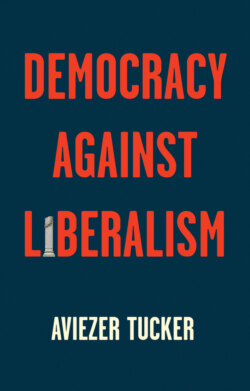Читать книгу Democracy Against Liberalism - Aviezer Tucker - Страница 12
Plan of the Book
ОглавлениеThe strategic plan of the book is to move from a general historically based comparative study of illiberal democracy to the current crisis of populist neo-illiberal democracy, its causes and scenarios for its future. The current predicament raises general questions about its historical evitability. Finally, on the basis of the previous chapters, I propose policy reforms that may preempt similar recurrences in the future, laying the foundations for new liberalism without nostalgia.
The next chapter, “Old Hemlock in Plastic Cups,” examines what neo-illiberal democracy is by comparing ancient and modern forms of absolutist democracy.
The third chapter, “All the Roads Lead to Caesarea,” examines the two types of path dependencies that have led to neo-illiberal democracy recently: Post-totalitarian technocratic to populist illiberalism, as it developed in Hungary and Poland; and the post-liberal populist illiberalism of established liberal democracies like the United States and Israel. I argue that neo-illiberal democracies are inherently unstable. They may result in a Caesarian transition to stable authoritarianism, or in a stable liberal restoration. Other scenarios are less probable.
The fourth chapter, “It Ain’t Necessarily So: The Historical Evitability of Neo-Illiberal Democracy,” examines the causes of neo-illiberalism. It argues for two mutually reinforcing large linear causes, atavistic misinterpretation of economic crises as evolutionary extinction events, and the blocking of social mobility. Numerous additional small non-linear causes were necessary for the apparent wave of populist neo-illiberal democracy. Therefore, this wave was evitable. It could have easily been otherwise and it may be reversed for similarly minute and non-linear causes.
The final chapter, “New Liberalism without Nostalgia,” proposes policy prescriptions. It is divided into three parts: first I propose measures for the preemption of populism; then, I suggest how to remove barriers to social mobility; finally, I suggest measures to strengthen liberal institutions. My policy recommendations are mostly “blue sky” or “loonshots,” and decidedly non-nostalgic. Unlike many political programs, I do not advocate a return to any “golden age.” I do not think the past was as great as nostalgia paints it, and I do not think it can be restored. Instead, I advocate the opposite of neo-illiberal democracy, new-liberal democracy. I outline what new liberalism may mean for the contemporary irreversibly globalized world, marked by syncretism more than universalism.
